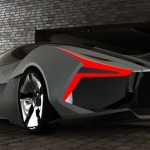 As the natural sources of oil and gas are drying fast, electric vehicles are only the hope our future relies on.
As the natural sources of oil and gas are drying fast, electric vehicles are only the hope our future relies on.
However, with the advent of electric vehicles more than a century ago, they suffer from the same range, charging and battery replacement problems. As a result, designers across the globe, time and again, have come up with some solutions and Pei-Cheng Hsieh of the Monash University is one of them. Pei envisions an Electric Vehicle for the year 2025, dubbed the Aerius electric concept.
This vehicle is powered by Michelin Active in-wheel electric motors at the rear and on-board electric motors in the front for persistent acceleration and active handling. Apart from aerodynamically efficient body, Aerius electric concept has solar panels to constantly re-charge the carbon nanotube super-capacitors to extend its range. The use of Michelin Active in-wheel electric motors at the rear has eliminated the suspension components, thus paving the way for airflow around the vehicle. Air flow has the dual role: it’s used to generate down force at high speeds and reduces the weight of the vehicle.
The form of the vehicle is heavily influenced by formula 1 race cars. Efficient aerodynamics was a main part of the concept thus forms on the vehicle was all designed around that concept. The materials chosen for the vehicle is aluminium and composite materials which reduces the weight of the vehicles and thus increases efficiency and reduces energy consumption. Aluminium is 100% recyclable, thus in the manufacturing process, the off cuts can be used to produce other products and there is no waste. The less energy is needed to power the vehicle, the less time is needed to recharge and the longer the travel distance.
Performance and environment have always been two separated areas that are rarely mentioned together. The Aerius concept represents the next step in high performance electric vehicles and incorporates the two together to form a new generation of high performance vehicle for tomorrow.



